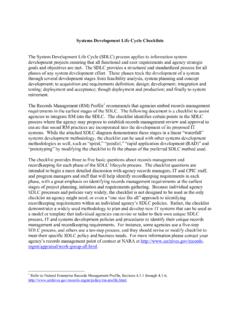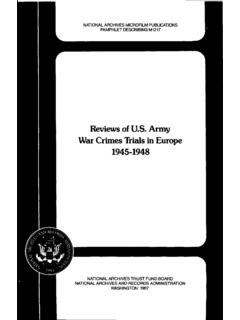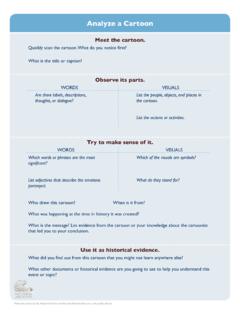Transcription of NATIONAL SECURITY COUNCIL 't!J-J - Archives
1 ','. NATIONAL SECURITY COUNCIL . 't!J- J. cc: PP(Zal/Wade). R&P(Dale/Dave). LarTY. Carol SL(orig). DECLASSIFIED UNDER AUTHORITY OF THE INTERAGENCY. SECURITY CLASSIFICATION APPEALS PANEL. 13526, SECTION (b)(3). ISCAP No. 200S-00a ,document .1. 4/16/92 SBCRB'f/!lOFORN 8 FIe A F i' 1. Defense i>lanning: Guidance. EX 1994-1992 (U). (U) Th:s Defense Planning Guidance addresses the fundamentally new situation which has been created by the collapse of the Soviet Union -- the diSintegration of the internal as well as the external empire, and the discrediting of Communism as an ideology with global pretensions and influence. The new international environment has also been shaped by the victory of the United States and its Coalition allies over Iraqi aggression -- the first post-Cold War conflict and a defining event in global leadership.
2 In addition to these two great successes, there has been a less visible one, the integration of the leading democracies into a U, system of collective SECURITY and the creation of a democratic "zone of peace.". (U) Our fundamental strategic position and choices ate therefore very different from those we have faced in the past. The policies that we adopt in this new situation will set the nation's direction for the next century. Guided by a fundamentally new defense strategy, we have today a compelling opportunity to meet our defense needs at lower cost. ~s we do SOl we must not squander the position of SECURITY we achieved at great sacrifice through the Cold War, nor eliminate our ability to shape the future SECURITY environment in ways favorable tQ us and those who share our values.
3 I. DEFENSE POLICY GOALS ( U). (D) The NATIONAL SECURITY interests of the United States are enduring, as outlined in the President's 1991 NATIONAL SECURITY Strategy Report: the survival of the United States as a free and independent nation, with its fundamental values intact and its institutions and people secure; a healthy and-growing economy to ensure opportunity for individual prosperity and resources for NATIONAL endeavors at home and abroad; healthy, cooperative and political:y vigorous relations with allies and friendly nations;. and a stable and secure world, where political and economic freedom, human rights and democratic institutions flouriSh. (U) These NATIONAL SECURITY interests can be translated into four mutually supportive strategic goals that guide our overall defense efforts: Our most fundamental goal is to deter or ;'defeat attack from whatever source, against States, its citizen~ and forces, and to honoe our historic and treaty commitments.
4 SiCRiT/HOFORH =81\AI'! .Q/l6/92 SECRB'f/NOPORN 2. The second goal is to strengthen and extend the system of defense arrangements that binds democratic and like-minded nations together in co~~on defense against agg~ession, builds habits of cooperation , avoids the renationalization of SECURITY policies, and provides SECURITY at lower costs and with lower risks for all. Our preference for a' collective response to preclude threats or, if necessarYt to deal with them is a key feature of our regional defense strategy. The third goal is to preclude any hostile power from dominating a region critical to our interests, and also thereby to strengthen the barriers against the reemergence of a global threat to the interests of the and our allies.
5 These regions include Europe, East Asia, the Middle East/Persian gulf , and Latin America. Consolidated, nondemocratic control of the resources of such a critical region could generate a significant threat to our SECURITY . The fourth goal is to reduce sources of regional instability and limit violence should conflict occur, by encouraging the spread and consolidation of democratic government and open economic systems t and discouraging the spread of destructive *t technology, particularly of weapons of mass destructio TO. this end, we must encourage other nations to respect t e rule of law and each other's economic, social, ethnic, and "4i -1-4. ,..126fi\J. poli t ieal interests. eI~/('lJer~, (U) To reach these goa1s t the United States must show the leadership necessary to encourage sustained cooperation among major democratic powers.)
6 The alternative would be to leave our critical interests and the SECURITY of our friends dependent upon individual efforts that could be duplicative, competitive, or ineffective. We must also encourage and assist Russia J Ukraine, and the other new republics of the former Soviet Union in establishing democratic pOlitical systems and free markets so they too can join the democratic zone of peace.". {U) A collective response will not always be timely and, in the absence of leadership, may not gel. While the United States cannot become the world's policeman and assume responsibility for solving every international SECURITY problem, neither can we al10. our critical interests to depend solely on international mechanisms that can be blocked by countries whose interests may be very different from our own.}
7 Where our allies interests are directly affected, we must expect them to take an appropriate share of the responsibility, and in some cases play the leading role; but we must maintain the capabilities for addressing selectively those SECURITY problems that threaten our own intere~ts. Such capabilities are essential to our ability to lead, and should international support prove sluggish or inadequate, to act independently, as necessary, to prote7~_3~r critical interests. fV\(fVe~} ~".('j .r~ ' , ~"f <?rt"" {~. 1"'~ ) (}"", .. { ,,' c, (.,~ IJ:. "",0'H- /Itipt'j 10 about- or.:;:;: (~SF~C? +0 U.~, leac: ) t'\Ot- Ct.( Golll (J/~" +rtf> '-k [f. SB RET/Hgi'Oa~ D R J F T. 4116/92 S~CR:iT/NOi'ORN 8 RAP !)))))]
8 F J. (U) We cannot lead if we fail to main~ain the high quality of our forces as we reduce and restructure them. ~s a nation we have never before succeaded in pacing reductions without endangering our interests. We must proceed expeditiously, but at a pace that avoids breaking the force or sending misleading signals about our intentions to friends or potential aggressors. An effective reconstitution capability is impprtant as well, since it signals that no potential rival could quickly or easily gai~ a predominant military position. (U) At the end of World War I, and again to a lesser extent at the end of World War TI, the United States as a nation made the mistake of believing that we had achieved a kind of permanent SECURITY , ~hat a transformation of the SECURITY order achieved through extraordinary &~erican sacrifice could be sustained without our leadership and significant American forces.
9 Today. a great challenge has passedi but other threats endure, and new ones will arise. If we reduce our forces carefully, we will be left with a force capable of implementing the new defense strategy. We will have given ourselves the means to lead common efforts to meet future challenges and to shape the future environment in ways that will give us greater SECURITY at lower cost. II. THE REGIONAL DEFENSE STRATEGY (U). ~ RegioDA~ [QCu~ (U). (U) The demise of the global threat posed by Soviet Communism leaves America and its allies with an unprecedented opportunity to preserve with greater ease a SECURITY environment wi~hin which our democratic ideals can prosper. We can shift our defense planning from a focus on the global threat posed by the Warsaw Pact to a focus on the less demanding regional threats and challenges we are more likely to face in the future.]
10 In tt~s way, we can work to shape the future environment and to preclude hostile nondemocra~ic powers from dominating regions critical to us. This same approach will also work to preclude the emergence of a hostile power that could present a global SECURITY threat comparable to:the one the Soviet Vnion presented in the past. In so doing we can provide the underpinnings of a peaceful internacional o~der in which nations are able to purs~e their legitimate interests without fear of military domination. CV) In this more secure international environment ~here will be enhanced opportunities for political, economic, environmental, social, and SECURITY issues to be resolved through new or revitalized international organizations, including the United Nations, or regional arrangements.










